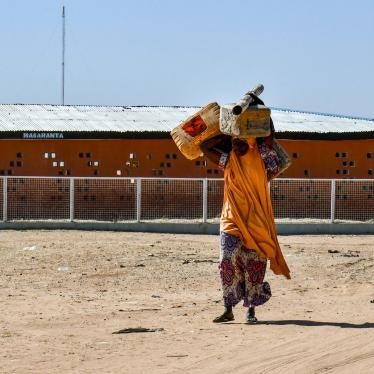The United Nations and the Angolan government are not providing sufficient protection for hundreds of thousands of people displaced during Angola’s civil war, Human Rights Watch said in a briefing paper released today.
Today, the U.N. Under-Secretary-General for Humanitarian Affairs and Emergency Relief Coordinator, Kenzo Oshima, begins an assessment mission to Angola. On July 11, the U.N. Security Council is expected to discuss renewing the mandate of the U.N. Office in Angola.
Internally displaced people (IDPs) in Angola continue to face serious security threats, including harassment by government forces, restrictions on free movement, and possible forced return to areas where they would be at risk of political persecution and human rights abuses, Human Rights Watch said. Hundreds of thousands continue to live in poor conditions in government-run camps without access to basic food or medical care.
Oshima’s visit comes just before a formal resettlement process for IDPs in Angola begins.
“Nobody in Angola should be forced to move against their will,” said Peter Takirambudde, executive director of Human Rights Watch’s Africa division. “The U.N. and the Angolan government have plans on paper to protect the internally displaced population, but these laws and programs are not being implemented on the ground.”
There are several U.N. agencies working with the internally displaced in Angola, but there is no single U.N. agency with clear formal responsibility for protection of internally displaced persons — contributing to the neglect they have suffered. Currently, the Office for the Coordination of Humanitarian Assistance (OCHA), of which Kenzo Oshima is the head, is responsible for overall coordination of initiatives to assist IDPs, including protection, but OCHA in Angola is already overstretched and does not have real expertise in protection work, Human Rights Watch said.
Since the death of rebel leader Jonas Savimbi in February, Angola has made rapid progress towards ending thirty years of conflict. But despite a ceasefire agreed in April and progress in negotiating a permanent peace, the need for attention to the displaced has become, if anything, more urgent. As access to previously rebel-held areas opens up, there has been a rise in the number of Angolans seeking immediate assistance, exacerbating the humanitarian crisis and raising the specter of new human rights abuses.
As many as one-third of Angola’s thirteen million people are internally displaced; another 435,000 Angolans fled the country altogether during the war and became refugees abroad.
Human Rights Watch said that in principle it considers the Office of the U.N. High Commissioner for Refugees (UNHCR) to be the most appropriate U.N. agency to assume operational responsibility for the protection of IDPs in Angola, based on its practical protection experience and expertise with forcibly displaced communities. However, UNHCR has been forced to phase out its involvement with IDPs in Angola, following the termination of United States and Japanese support for the program.
As OCHA is currently the only U.N. agency on the ground in Angola with the capacity to provide oversight and carry out protection work, Human Rights Watch urged that OCHA continue with its protection activities for IDPs in Angola. In the absence of UNHCR protection officers in all the provinces, OCHA should also assume responsibility for taking up individual protection cases and raising grievances with the government authorities. Human Rights Watch urged UNHCR to include protection for IDPs in its refugee repatriation programs and called on donor governments to provide funding for this.
Human Rights Watch also called on the U.N. Security Council to include clear provisions for protection of IDPs in the resolution it will be discussing on July 11.






